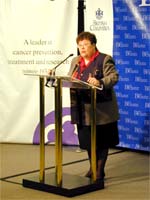Cancer Research Centre Gets Knowledge Development Funding
Canada's first fully integrated cancer research centre will be built at the B.C. Cancer Agency's downtown Vancouver site
Vancouver, BC, Canada | Canada's first fully integrated cancer research centre will be built at the B.C. Cancer Agency's downtown Vancouver site, with $27.8 million from the B.C. Knowledge Development Fund, Premier Ujjal Dosanjh announced today.

Premier Ujjal Dosanjh (left), Dr. Simon Sutcliffe, president and CEO of BC Cancer Agency (middle), Indira Samarasekera, UBC Vice President of Research (right).
"Cancer is a disease that touches so many people's lives," said Dosanjh. "The new research centre will enable the B.C. Cancer Agency to remain a world leader in efforts to beat this terrible disease."
The new centre will support a broad range of research programs and will house a major genome sequencing centre, continuing the work of the late Dr. Michael Smith. It will be built on West 10th Avenue, across the street from the Agency's primary treatment centre.
"Health research is an essential part of our commitment to improving health care in British Columbia," added Dosanjh. "Innovation in treating cancer builds on the steps we are taking to strengthen our health system. This approach provides new funding for health regions, for new equipment, to hire and train more doctors and nurses and to expand research that enables our health-care professionals help more people."

Advanced Education Minister Cathy McGregor.
Support for the $82-million project is also being provided by the Canada Foundation for Innovation and the B.C. Cancer Foundation.
| "The new research facility, which will include the Genome Sequencing Centre, will be one of Michael Smith's many legacies to the research community of the University of British Columbia and our partner, the BC Cancer Agency." |
"This project shows the huge impact the B.C. Knowledge Development Fund is making on research science in B.C.," said Advanced Education Minister Cathy McGregor. "It also shows how the fund strengthens partnerships. An excellent collaboration between the agency and the University of B.C. was critical to making this project happen."
The non-profit Cancer Agency has a long-standing record of excellence in attracting donations for cancer research. Agency-sponsored research also has successfully translated into viable biotechnology businesses, spawning more than 13 spinoff companies that employ 250 people and generate $75 million in export activity.

Dr. Simon Sutcliffe, president and CEO of BC Cancer Agency (left), Premier Ujjal Dosanjh (middle), Advanced Education Minister Cathy McGregor (right).
"Our current understanding of cancer has taken us as far as we can in our ability to control this disease: It is only through new knowledge generated by research that we will be able to prevent and control it effectively," said Dr. Simon Sutcliffe, president and CEO of the B.C. Cancer Agency. "This new building truly is a joint project - one-third federal, one-third provincial and one-third thanks to public support. The provincial funding announced today will ensure the new cancer research centre will be built and that the people of B.C., and Canada, will benefit from earlier access to innovative treatments."

"This is an extraordinary investment that will position BC as a leader in cancer research, leading to discoveries that will be the basis for a cure for cancer," said Indira Samarasekera, UBC Vice President of Research. "The new research facility, which will include the Genome Sequencing Centre, will be one of Michael Smith's many legacies to the research community of the University of British Columbia and our partner, the BC Cancer Agency."
The new labs will have room for 40 full-time researchers and over 600 scientific and medical personnel, space that will allow the agency to increase its staff by over 250 full-time positions.
The new building will have more than 20,000 square metres of space when completed. This will include eight major laboratories, as well as space for offices and administration. Demolition of the existing structure is expected to start later this year. The new building is expected to open in 2004.
